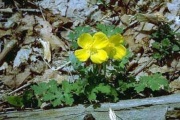Difference between revisions of "Celandine"
Jump to navigation
Jump to search
m (Text replace - "== Authority ==" to "== Sources Checked for Data in Record ==") |
|||
| Line 1: | Line 1: | ||
| − | [[File:celandinepd1.jpg|thumb|Celandine | + | [[File:celandinepd1.jpg|thumb|Celandine ''Chelidonium majus'']] |
| − | |||
| − | ''Chelidonium majus'']] | ||
== Description == | == Description == | ||
| Line 10: | Line 8: | ||
''Chelidonium majus'' (greater celandine); swallowwort; tetterwort; fellonwort; wartweed; kill-wart; devil's milk; celidonia (It.) | ''Chelidonium majus'' (greater celandine); swallowwort; tetterwort; fellonwort; wartweed; kill-wart; devil's milk; celidonia (It.) | ||
| − | == | + | ==Resources and Citations== |
| − | |||
* R.J. Adrosko, ''Natural Dyes in the United States'', Smithsonian Institution Press, Washington, DC, 1968 | * R.J. Adrosko, ''Natural Dyes in the United States'', Smithsonian Institution Press, Washington, DC, 1968 | ||
Latest revision as of 08:09, 24 May 2022
Description
A yellow to orange dye obtained from the greater celandine, Chelidonium majus, plant. The celandine dye is extracted from the ground roots, stems, and leaves. It produces a yellow dye with good lightfastness using an Aluminum Mordant.
Synonyms and Related Terms
Chelidonium majus (greater celandine); swallowwort; tetterwort; fellonwort; wartweed; kill-wart; devil's milk; celidonia (It.)
Resources and Citations
- R.J. Adrosko, Natural Dyes in the United States, Smithsonian Institution Press, Washington, DC, 1968
- R.D. Harley, Artists' Pigments c. 1600-1835, Butterworth Scientific, London, 1982
- Random House, Webster's Encyclopedic Unabridged Dictionary of the English Language, Grammercy Book, New York, 1997
